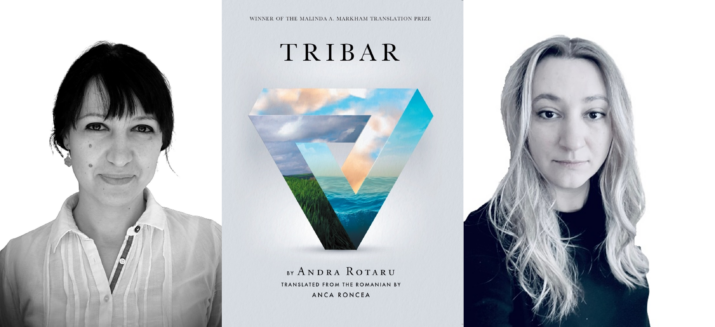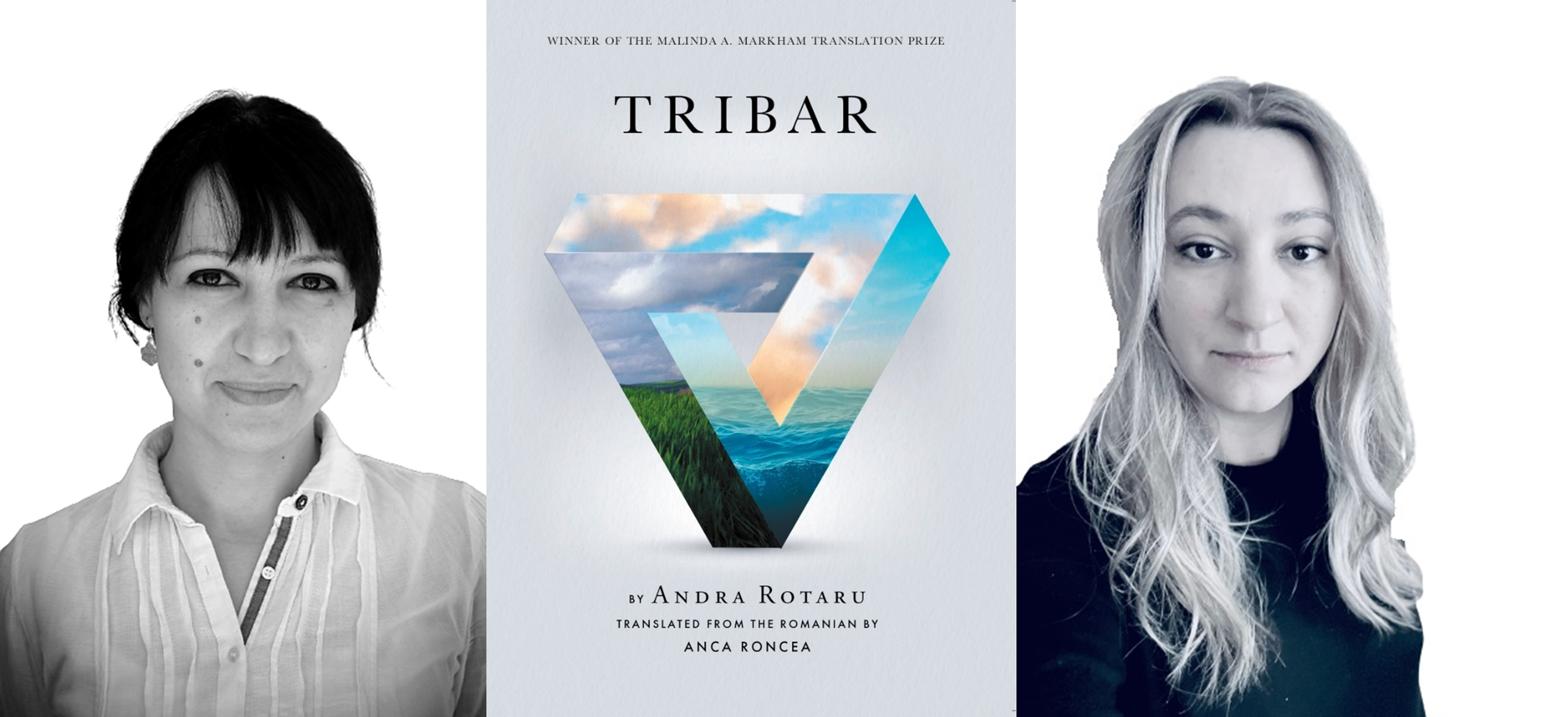

Translated from the Romanian by Anca Roncea.
anxiety – fear of life – practicing repetition
(encore)
the construction was repeatedly referred to as Phantom House. although
no unknown face appeared to anyone, the setting was impossible to bear.
on the first day we were met by a dying child. basking in the sun, sitting
on a manhole cover. around, there were three other children: one with
a torn eye, one with dermatitis and an ear torn off and another very
pale, soaked in blood.
we entered the events hall where our reception was scheduled, complete
with beer, pretzels, pastries. upon stepping into the room, we skip
over the pool of blood clots.
we can’t let the driver see this, if he sees blood he’ll faint, he’s very sensitive! the
driver rushes to the backyard, lays the dying child on a comforter. I’ll
take him far, so he doesn’t die here, so we don’t see him. through the window
we see the child’s tongue dangling on the side: can’t a doctor come already?
what for? he’s dying of old age. he can’t go on for very long. he’s going. when they
feel the end is coming, children retreat, but this one crawled all the way here, to give
his heart out. he’s paralyzed from the waist down, he’s going. he’s not ours, he’s been
here for twenty years.
but what about the other one? why is there blood?
gave birth. going too.
can’t a doctor come?
this one isn’t ours either. I’ve seen so many, I don’t want to get in the middle of it
again. there are no doctors here.
but something must be done!
I have my own patients in town, and the doctor…
aaah, so there is a doctor!
Lătănescu! what a doctor…
how long has the bleeding been going on for?
two days.
can we get the doctor’s phone number?
we don’t have it. we can’t see. we don’t know.
(pause)
(the local creed: we remove the agonizing body from sight, all problems
disappear) girls, can I do something to help? anything, anything you need.
we need antihemorrhagic pills, we want vitamin K, we want a doctor!
anything, anything. but tell me if you want anything!
morning—noon. in the yard emptied of the image of the dying child
with its tongue out, the dying came back. he sits on the manhole cover
and stares at us. he greets us good morning, eats vitamin biscuits and
cornflakes we give him.
see? he’s got nothing wrong with him, he’s not even got a death. he’s been pulling this
kind of stuff for years only when guests are around. he pretends to die, then resurrects.
there you go!
noon—evening. the dying fell on one side, with feces on and flies circling.
he blinks. there are black suds around his mouth, clinching it. I
caress him and his eyes water. I tell him he’s going to be ok.
evening—morning. 48 hours from our arrival, the child is now a frozen
body with feces on. the women pass him by, he’s not theirs, they shrug
their shoulders. two hours later he’s still left on the manhole cover, he’s
not theirs. we shrug, shrug. shoulders, shoulders. the drills in the square.
we shrug one more time and all our problems disappear. we’re extravagant.
we must shrug our shoulder, do our calisthenics. never miss a
move, know everything about everyone.
Inter mezzo. Mockingbird
they gather now and then. you see them placing candles in the sand for
the living or for the dead. they move it to the side.
then their thin voices, hands hitting the ground. each of the children
carry another child under their arms. the abrupt rhythm of barefoot feet
when they hit the ribs. a human pyramid of a smaller size.
the way I carry you and you stretch out like a bird of the abyss, we can
lie in a cross, a smaller one over a larger one, a flock learns to migrate
continuously.
Hush, little baby, don’t say a word.
Mama’s gonna buy you a mockingbird
And if that mockingbird won’t sing,
Mama’s gonna buy you a diamond ring
And if that diamond ring turns brass,
Mama’s gonna buy you a looking glass.
And if that looking glass gets broke,
Mama’s gonna buy you a billy goat.
joy mixed with the scent of wooden benches and the alcohol saturated
in them.
these kitschy eagles, their eyes painted.
what does it mean to fall in love.
cells revive their memory, something learned a long time ago
it reappears now. love is just as empty before becoming one
Lord I’m one, Lord I’m two, Lord I’m three, Lord I’m four
Lord I’m 500 miles away from home
Thoughts: what you think
when there is nothing that goes on
and nothing to separate from, we improvise a middle ground,
where we can rest. this new rudimentary space,
with no joining connecting the parts
of any other world. the body learns to rest,
the noise of its settlement there doesn’t exist either.
Physical sensations: what you feel
I’m learning to separate emotions. their energy,
a conglomerate,
the discomfort of one and the euphoria of the other one
Behaviors: what you do
not to think, not to perceive. to return to a space where I was once ok.
a temporary settlement.
the weak muscles of the body. the rudimentary sketch of this place.
script for me and script for him.
I have never seen a body so young, exhausted
and you, with which one of us will you
head home?
I never carried the body like a child,
I never saw it as a friend.
joy in this abandoned country
through which memories pass. where nothing
connects to something else, where there are no fingerprints left
I am
Andra Rotaru is a poet and author of a number of projects in collaboration at the intersection of arts. An awardee of the International Writing Program of Iowa (2014), Andra is also the author of Într-un pat sub cearsaful alb (In a Bed Under the White Sheet, 2005); En una cama bajo la sábana blanca (the Spanish translation of her debut volume, 2008); Tinuturile sudului (Southern Lands, 2010); and Lemur (2012). In 2018, Lemur was published in English by Action Books, translated by Florin Bican, and Tribar was published in 2022 in English with Saturnalia Books and in German by Elif Verlag, translated by Alexandru Bulucz. Tribar was nominated for two Pushcart prizes and won two prizes in translation. In August, Andra will be a poet in residence at the Literarisches Colloquium in Berlin.
Anca Roncea is a graduate of the Iowa Writers’ Workshop, University of Iowa’s MFA in Literary Translation and is currently a PhD student in comparative literature (International Writers’ Track) at Washington University in Saint Louis. Anca’s poetry has been published in the Berkeley Poetry Review, Beecher’s Magazine, Omniverse, the Bare Life Review, and Lana Turner. Her translation from Romanian of the poetry collection Tribar by Andra Rotaru was published in 2022 by Saturnalia. She is currently working on her first book of poetry, an experimental translation that aims to create a speculative archive of the work and presence of women artists of the Dada Movement.
This excerpt of Tribar is published by permission of Saturnalia Books.
Published on July 18, 2023.




